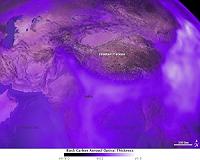| . |  |
. |
Sheffield UK (SPX) May 26, 2011 A team of scientists from the University of Sheffield and Bangor University have used a computer climate model to study how freshwater entering the oceans at the end of the penultimate Ice Age 140,000 years ago affected the parts of the ocean currents that control climate. A paper based on the research, co-authored by Professor Grant Bigg, Head of the University of Sheffield's Department of Geography, his PhD student Clare Green, and Dr Mattias Green, a Senior Research fellow at Bangor University's School of Ocean Sciences, is currently featured as an Editor's Highlight in top US journal, Paleoceanography. The study is the first of this kind for the time period. The research found that freshwater entering the ocean from melting ice sheets can weaken the climate controlling part of the large-scale ocean circulation, with dramatic climate change as a consequence. During the period of the study, the experts noted that the global temperature dropped by up to two degrees over a few centuries, but changes were not uniform over the planet, and it took a long time for the climate to recover after the ice sheets had melted completely. The team argues that it is not only the volume of freshwater being released from the melting ice sheet which is important but also the state of the freshwater: icebergs act to reduce the ocean circulation less than meltwater, but the effects of icebergs last for longer periods of time. The effect is similar to the difference between adding very cold water to a drink or adding an ice cube or two. The study also shows that at the end of the more recent Ice Age 20,000 years ago, the ocean circulation was more sensitive to ice sheet collapses than during the earlier period. Professor Grant Bigg, Head of the University of Sheffield's Department of Geography, said: "An important component of the work is that it shows that the impact of freshwater releases from past, or future, ice masses depends critically on the form - whether fresh water or icebergs - and the location of the release. "The Arctic has been surrounded by extensive glaciations several times in the past and this study has shown that large-scale changes in such Arctic ice sheets could affect the climate in places far from the release site. Our work also suggests that the Pacific Ocean may have been more sensitive to major changes in past glaciations than previously realised. We plan to investigate this possibility more in the future." Dr Mattias Green from Bangor University, added: "With meltwater- similar to adding water to your drink, the water spreads out quickly and has an immediate effect, but it is also absorbed quickly into the rest of the ocean. In a similar way to your ice cube, the icebergs drift along and melt more slowly. This means the immediate impact is weaker, but they are there for a longer time and distribute the water over a larger area. "Our results lead us to conclude that a future ice sheet collapse, that might happen in Antarctica or Greenland, would have climatic consequences, but the exact impact needs to be evaluated in each case."
Share This Article With Planet Earth
Related Links University of Sheffield Beyond the Ice Age
 Soot Packs A Punch On Tibetan Plateau's Climate
Soot Packs A Punch On Tibetan Plateau's ClimateRichland WA (SPX) Mar 08, 2011 In some cases, soot - the fine, black carbon silt that is released from stoves, cars and manufacturing plants - can pack more of a climatic punch than greenhouse gases, according to a paper published in the journal Atmospheric Chemistry and Physics. Researchers at the Department of Energy's Pacific Northwest National Laboratory, the University of Michigan and NOAA found that soot landing o ... read more |
|
| The content herein, unless otherwise known to be public domain, are Copyright 1995-2010 - SpaceDaily. AFP and UPI Wire Stories are copyright Agence France-Presse and United Press International. ESA Portal Reports are copyright European Space Agency. All NASA sourced material is public domain. Additional copyrights may apply in whole or part to other bona fide parties. Advertising does not imply endorsement,agreement or approval of any opinions, statements or information provided by SpaceDaily on any Web page published or hosted by SpaceDaily. Privacy Statement |